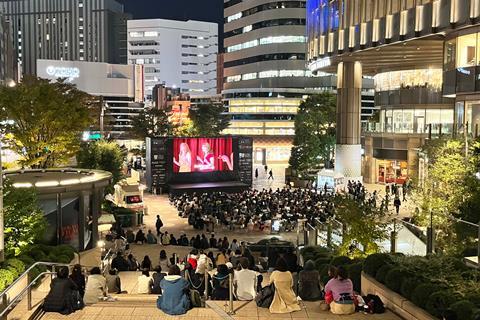Tokyo International Film Festival is establishing closer ties to Asia and increasing the size of its programme — all in anticipation of its biggest event since 2019.

A significant boost in the number of films and guests will be evident at the 36th Tokyo International Film Festival (TIFF).
TIFF festival chairman Hiroyasu Ando has outlined three priorities for this year’s edition, which returns fully free of pandemic restrictions from October 23 to November 1. The first is to increase the festival’s scope. The programme will feature 219 films, up from 174 in 2022, and more than 600 international guests are expected to attend. That number was just over 100 last year, when the Japanese government was just beginning to relax travel restrictions.
“I am very excited we can have so many guests from around the world, compared to last year,” says TIFF programming director Shozo Ichiyama. “For film festivals, we need people. Meeting the filmmakers or actors is very important for Japanese audiences.”
Notable guests include actor Tony Leung, who will conduct a masterclass, and filmmakers Tran Anh Hung, Aleksey German Jr, Veit Helmer, Jia Zhangke, Kelly Reichardt and Wim Wenders, who serves as jury president of the Competition section. Acclaimed Chinese director Zhang Yimou receives a lifetime achievement award and participates in a talk as part of the festival’s TIFF Lounge sessions.
Wenders’ Perfect Days, starring Koji Yakusho, opens the festival, while Godzilla Minus One, Japan’s first live-action feature with the iconic kaiju since Hideaki Anno’s Shin Godzilla in 2016, closes this year’s event.
The second priority for the post-pandemic TIFF is to create a more festive atmosphere. Taking place in Tokyo’s Hibiya district of Ginza, efforts to that end include the first opening party since 2019.
There will also be several screenings and events in collaboration with venues in Tokyo, such as Japan’s National Film Archive. The archive and festival will jointly screen nearly all the feature films of Yasujiro Ozu, while Wenders, Jia, Reichardt and Kiyoshi Kurosawa will take part in a discussion about the legendary Japanese filmmaker.
The festival is also launching the first Marunouchi Film Festival in the Marunouchi Building near Tokyo Station. The mini festival features titles directed by Wenders and Rikiya Imaizumi, whose films appear frequently at TIFF.
In addition to the recently established Kurosawa Akira and Amazon Prime Video Take One Awards, TIFF will introduce the new ethical film award. It will be given to a film with “concepts that display concern for the environment and society”.
Asian outreach
The third priority for the 36th edition of the festival is to forge closer links with other Asian countries and regions. More than 60% of this year’s films and over half the expected international guests are from Asia.
“It’s important to keep the connection to other Asian film festivals,” says Ichiyama, who notes that in recent years Asian films have had a difficult time securing berths at European and US festivals, which he sees as increasingly dominated by Netflix productions and awards hopefuls.
“I don’t think it’s a good idea [for TIFF] to compete with Cannes, Venice and Berlin,” says Ichiyama. “I think Tokyo should become a place where Asian filmmakers prefer to premiere their films, and that we should keep in contact with good Asian filmmakers.”
Ichiyama is especially pleased with this year’s number of entries from China, including Competition titles Dwelling By The West Lake, A Long Shot and Snow Leopard, marking the first time the section has featured three Chinese films in a single year. Last year, the festival featured just one title from the country.
“I heard there was very strong censorship in China last year,” says Ichiyama. “Some films didn’t get approval to shoot, and some that were shot didn’t get approval for release. But at the beginning of this year, there were some changes at the Chinese film authority. I’m not sure whether this will continue, but it’s a very good year for the Chinese film scene.”
As part of its Asian outreach, the festival will also hold a masterclass for film students from Beijing, Hong Kong, Thailand, China, Indonesia, Malaysia, the Philippines, Vietnam and Japan, taught by Japan’s Hirokazu Kore-eda. This is part of Ichiyama’s long-term vision for the festival to make a notable contribution to the future of cinema.
“We should do more than just show films. Of course, our primary mission is to show good films, but workshops for young talent are necessary for our film festival,” says Ichiyama. “If some of these students become filmmakers and have good memories of Tokyo, they might come back to TIFF with their new films.”
Another opportunity for filmmakers to interact is the TIFF Lounge (formerly the Asia Lounge), which features directors, producers and actors in conversation. Scheduled speakers include Tran Anh Hung, Zhang Yimou, Yoji Yamada and Gu Xiaogang.
This year’s Japanese director in focus is Hideo Jojo, whose career began in erotic films (known in Japan as ‘pink films’) and went on to direct more than 100 features. Ichiyama says Jojo first caught his attention due to this prolific output, but on watching some of the films he was impressed by the quality and variety of the director’s work.
“This will be a good chance for foreign film festival programmers to discover Hideo Jojo, because they haven’t yet realised that Japan has this unique filmmaker,” says Ichiyama.
A strand undergoing significant change this year is the animation section, which previously focused solely on Japanese titles but has been expanded to include international feature films.
“There have been many good animated films from Europe, Latin America, all over the world,” observes Ichiyama. He hopes the addition will help stimulate Japanese animators and anime fans, who, he notes, have a reputation for being “isolated” from animation made outside the country. Conversely, Ichiyama adds that international animators tend to embrace Japanese work and are “excited to participate in this programme”.

























No comments yet